Do You Need To Be The First To Be Considered Original?
This past week was a chaotic one — I recently took up a job working as a production and logistics coordinator for a local, but professional choral ensemble. The first concert of their reduced season, instead of being their normal 18-part choir, was simply a soprano and collaborative pianist in recital. At the last second, they asked if I could page turn, which I agreed to (I like listening to music with scores in front of me anyway). This performance was outside, and this one in particular was in a garden. This meant birds were singing throughout the entire concert. The accompanist (a Frenchman) whispered to me during Debussy’s Trois Chansons de Bilitis, “I bet Messiaen would have loved this setting”.
When thinking about this coming week’s class topic, originality in musical composition, I immediately thought about Olivier Messiaen, a French 20th-century composer whom Eric Salzman in the New York Philharmonic’s archived concert program from 6/24/1975 writes is “An organist, a Catholic mystic and a musical original.” (New York Philharmonic Archives, Page 5, Fourth Paragraph). To ask the question at hand, what makes Messiaen a musical original?
Though I would consider my experience with Messiaen’s music to be less-than-ideal, I was fortunate to have an undergraduate music theory professor who was a former student of Messiaen’s, so our class often heard anecdotes about his compositional style as well as his musical influences. One of the most unique aspects of his music is the influence of birdsong — not that this is an entirely original idea, but rather the manner of how he used it.
Performance of Quartet for the End of Time, with score
One of his most famous works, Quartet for the End of Time, was his first piece to utilize bird songs, and was written in a unique place — at a POW camp in then-Germany (now Poland) in 1940. In a documentary I viewed about Messiaen from the United States Marine Band “The President’s Own”, the narrator states the dual forces present in this work: on one side, there is the absence of time (denoted by the fermatas with musical action involved, such as crescendos); and living in the present, by the use of birdsong. The work undoubtedly reflects Messiaen’s time at the POW camp and the sounds of his experience, many of which are birds who sing at daybreak (such as the first movement, entitled Liturgy of Crystal, which features a blackbird and nightingale). The story is told that Messiaen wrote sketches to the piece while on transit to the camp, and it premiered in the freezing cold (January 15, 1941) using the instruments on hand, including a violin, cello, clarinet, and piano.
This particular setting brings up a complicated question about how we define originality in music: is originality dependent on one’s unique circumstances in which they compose; or is it dependent on their ideas and compositional process alone? The reason I ask is because of how Messiaen wrote this piece: the story goes on to say many of the keys of the piano were broken, the cello only had three strings, and if one knows anything about wooden instruments, they were all likely damaged due to the cold where they were performed. (NYP Archives, Page 5, Sixth Paragraph) Messiaen thus had many limitations he had to adhere to, which other composers using the same instrumentation did not have to. (Hindemith for one composed Quartet for Clarinet, Violin, Cello, and Piano, 1938). To me, Messiaen’s situation implies while not the direct definition of ‘originality’, that a composer’s unique circumstances and limitations could contribute to a piece that could be understood as original. In the balancing act between sonic result and motive for composing, is there a common ground that music consumers could find to specifically define the word ‘originality’? Does it always need to be ‘the first’ to do something? Let me know what your thoughts are!
